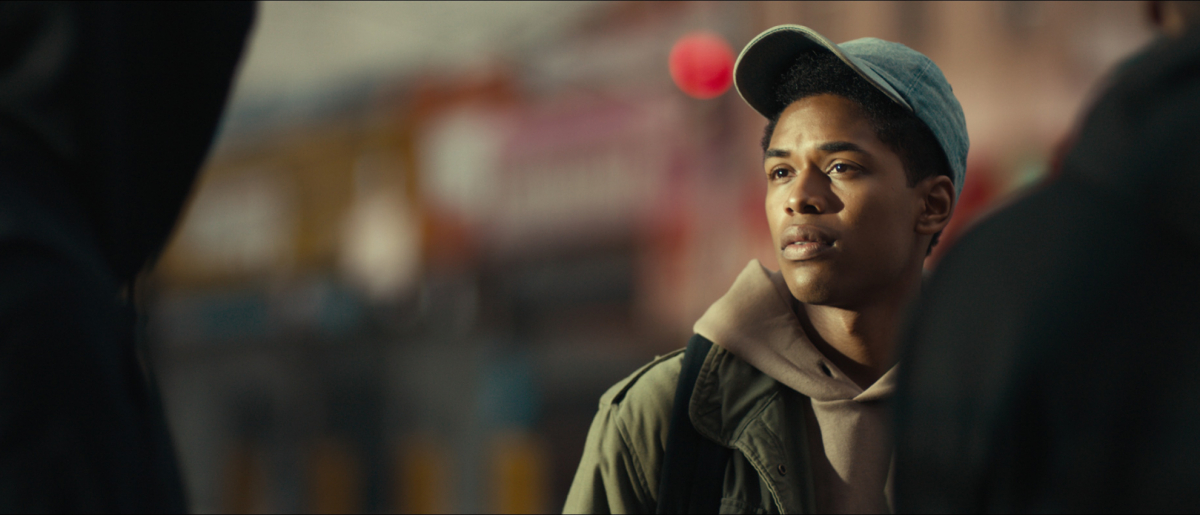
Before "Jokering" around, Joaquin Phoenix noted in the 2005 documentary Earthlings: "Since we all inhabit the earth, we are all considered earthlings. There is no sexism, racism, or speciesism in the term 'earthling.' It encompasses each and every one of us: warm- or cold-blooded, mammal, vertebrate or invertebrate, bird, reptile, amphibian, fish and human alike."
In a far better world or, more realistically, only in a sci-fi novel, such a state of congenial existence with no negative "isms" might be achieved. We're not there though, and consequently salamanders, sardines, and koalas don’t have it easy. However, Cinematters: NY Social Justice Film Festival, which runs from January 16–20, is a new annual event that limits its focus to just humans and their plight. Even with that narrow focus, the event has its hands full.
Opening night showcases Anthony Mandler's All Rise, a true tale of a black honors student charged with felony murder. Jennifer Hudson and Kelvin Harrison Jr. (Waves) star.
Leana Hosea's doc, Thirst for Justice, dives into America’s contaminated water crisis, focusing on communities in Flint, Michigan, and Sanders, Arizona, and the accompanying health effects such as ovarian cancer and lead poisoning. (One in four of your fellow U.S. citizens are currently sipping and bathing in possibly pestilent H2O, but you already knew that, right?)
Barak Goodman and Chris Durrance's Slay the Dragon takes on gerrymandering; Linda Goldstein's We Are the Radical Monarchs follows a group of moms and their daughters as they create an alternative to the Girl Scouts where minorities do not feel left out, and so forth and so on.
As for Adam Zucker's vibrant American Muslim, this hard-hitting doc bristles forth with facts such as "nearly 60% of Muslims living in in the United States are first-generation immigrants," most of whom have become American citizens, with the majority living in New York City. The film, shot in the time immediately after Donald Trump passed his travel ban affecting seven Muslim countries, captures the plight of those affected and those trying to help the same in communities such as Ozone Park, Queens, and Sunset Park, Brooklyn.

Amidst footage of 5,000 men praying in a parking lot, interviews about being female and Muslim, fundraising for indigent families, speeches in a synagogue, plus a marshmallow-in-the-mouth stuffing contest, there are chats about the Koran and belief systems: "Religion is personal. It's how you connect with your inner self. Your creator."
There are also community dances to protest Trumpian policies plus tales such as that of a father picked up by the authorities while his daughter, a 7th grader, was in school. What grief did she come home to? Yet the film’s message is: "Do not despair. Have hope." Luckily, there are signs of progress as one man observes: "Our neighbors don’t think we’re as strange as they used to."
This is a timely doc that addresses an ignorance-fueled hatred embraced by so many FOX-aholics. Yet if any of these MAGA-capped folks would ever watch Zucker's applaud-worthy offering, their bigotry might be decimated. The chances of them purchasing tickets for this screening? Nil. I know. I’m related to a bunch.
Michael Barnett's Changing the Game, a moving documentary on three trans-teens competing in the sports arena, also incorporates a reaction or two to Trump, here though to his vilification of the non-cisgendered.
Mack Beggs is a Texas high-school wrestler forced to wrestle girls while he considers himself a boy. Does being on testosterone give him an unfair advantage? Some of the media, a few of Mack's opponents, and many of their parents certainly feel so. And what happens when he wins the state championship?
Intercut with his journey is Sarah Rose Huckman's. She's a transgender female skier, who sometimes holds back from winning her events to avoid criticism that it's inequitable for her to compete against cisgender girls her age because of her biology.
Andraya Yearwood is a runner, who also faces similar hostility. An old-school feminist, attending one of Yearwood's runs, rants that this teen has "made a mockery of women's sports."
Thankfully, these determined athletes all have support from their parents, guardians, friends, and coaches. Yet in a world when coming out as just gay or lesbian is still not a walk in the park, to be trans seems that much harder. According to a 2018 study by the American Academy of Pediatrics and as reported by the Human Rights Campaign, "more than half of transgender male teens who participated in the survey reported attempting suicide in their lifetime, while 29.9 percent of transgender female teens said they attempted suicide. Among non-binary youth, 41.8 percent of respondents stated that they had attempted suicide at some point in their lives." As Beggs' grandfather notes, "There's always some redneck against [them]."
Yearwood's mom agrees and explains why athletics must be open to her daughter and other trans teens:
"This is important. We’re talking about life or death. It scares me the numbers what she's up against. What my child won't be is suicidal. What my child won't be is on drugs. If track gives these young kids an opportunity to be living their truth, how dare we take that away from them. So for me that's being unfair. That's more than being unfair. That's cruel."
Tales of the City's author, Armistead Maupin, once noted, "The world changes in direct proportion to the number of people willing to be honest about their lives." This is what Changing the Game is about . . . as is Cinematters.
The fest's closing night feature is the highly successful Harriet Tubman bio that has just earned its star Cynthia Erivo a Best Actress Oscar nom. With the emotional restraints of a Lifetime movie, Harriet, though no doubt thoroughly researched, has a way of making the truth seem counterfeit. Did Tubman really get on her knees every ten minutes and ask God whether to go left or right with the slaves she was trying to free? As filmed and as directed, you’ll have to take a leap of faith to accept Harriet’s own faith as depicted.
For example, here's a scene taken directly from the screenplay, in which William Still, known as the "Father of the Underground Railroad," is attempting to convince Tubman to give up endangering herself.
Still: I won't have you captured and killed. I'm removing you from the network.
Harriet: I got my own network. I'll team up with John Brown. He’s . . .
Still: I can't lose you.
Harriet: You tol' your wife that?
Still: Don't be cruel.
Harriet: You de cruel one.
Still: If I had met you first . . .
Harriet: I'm not your type.
Still: How could you be? I never dreamt God made such creatures.
Harriet is moved. They stand close to each other, the air electric between them, dwelling for a moment in intoxicating possibility . . . before reality sobers them up.
Yet, if you can overlook the awkward moments as written by Gregory Allen Howard (Remember the Titans) and Kasi Lemmons (Eve's Bayou), and Lemmons' often embarrassing direction (e.g. cardboard villains), Harriet can still serve as a powerful introduction to the topic for young folk.
And with an impressive list of events and a noteworthy slate of films, the much-needed Cinematters, launched by the Marlene Meyerson JCC Manhattan, is clearly making an equally powerful debut on the fest circuit. (Tickets can be purchased online.)
